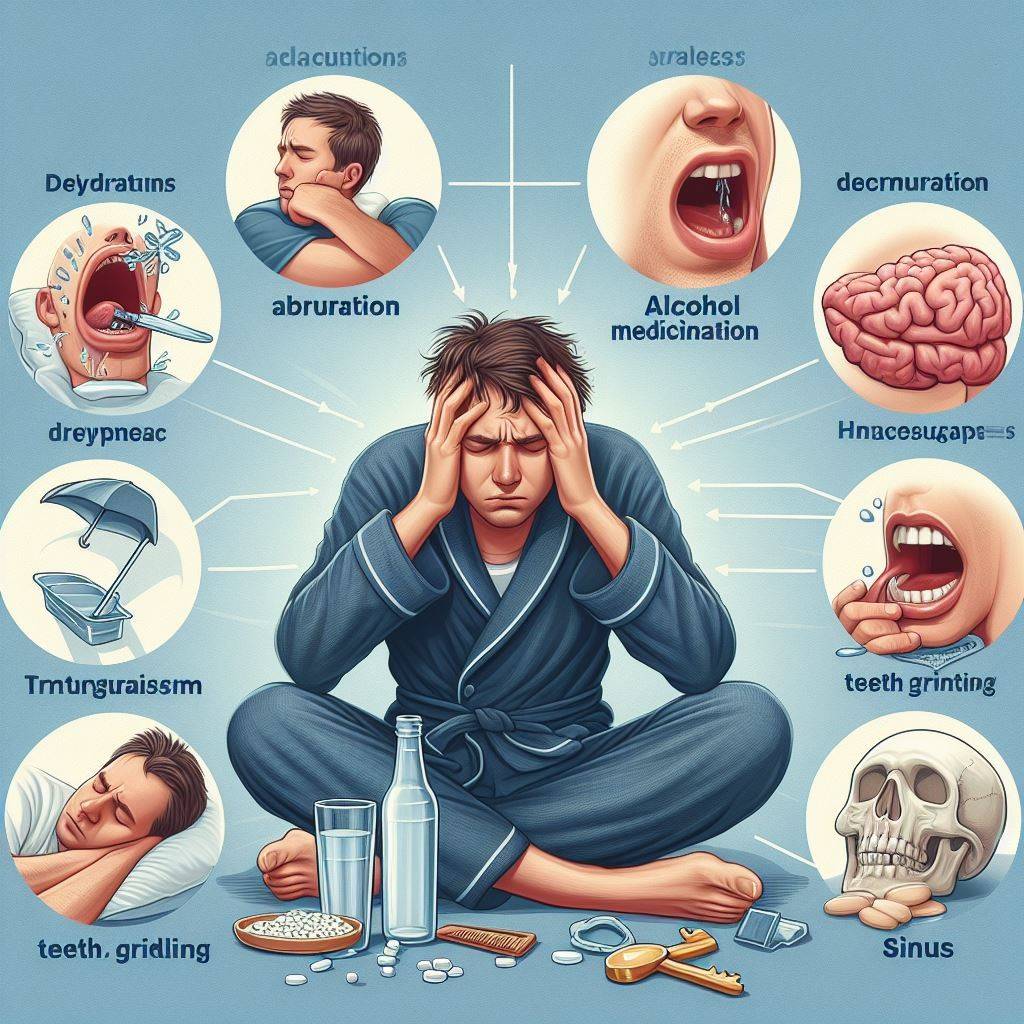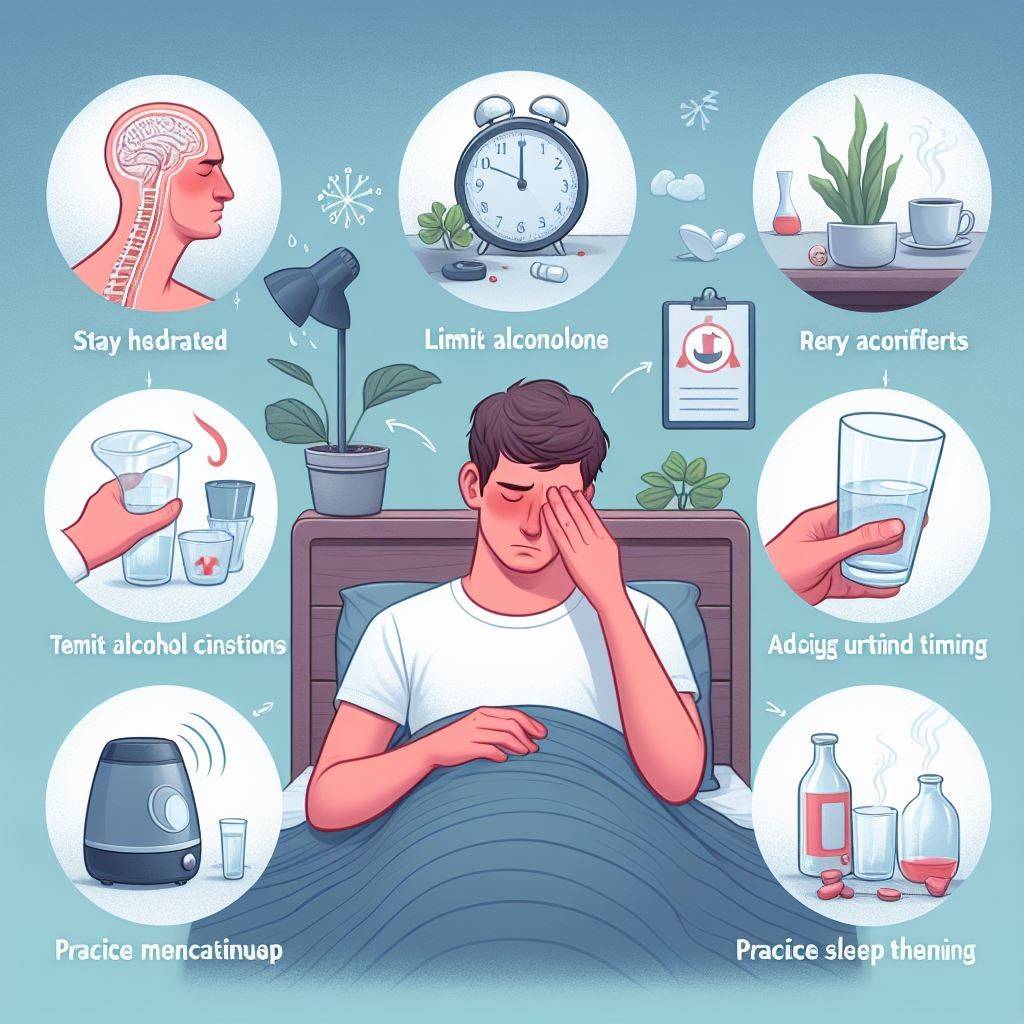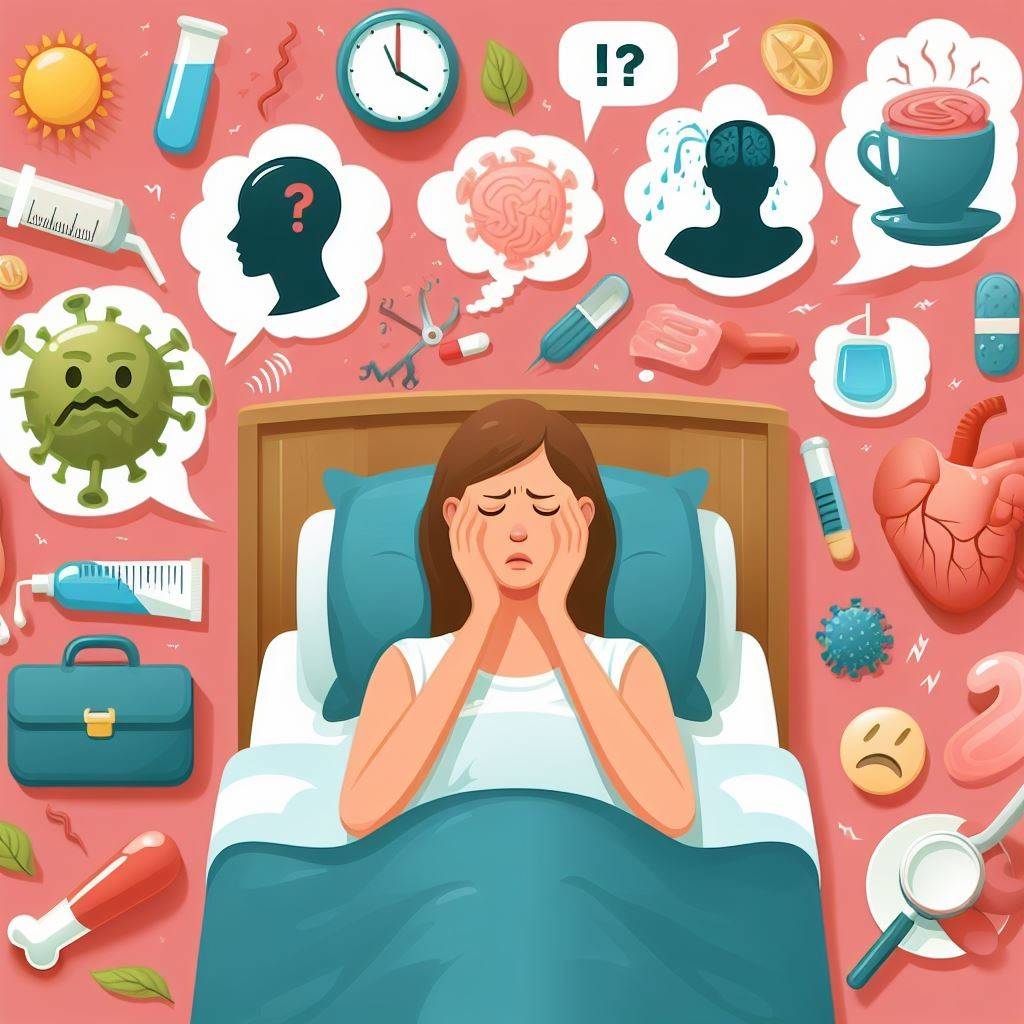Why Do I Wake Up with a Headache and Dry Mouth? Explained: Causes and Solutions.
Why Do I Wake Up with a Headache and Dry Mouth? Discover the common causes, from dehydration to sleep apnea, and effective solutions to start your day refreshed.
Introduction
Why do I wake up with a headache and dry mouth? This is a frustrating experience that many people face regularly. There are several potential causes for waking up with a headache and dry mouth, ranging from dehydration and alcohol consumption to underlying health conditions like sleep apnea or teeth grinding. Understanding the root cause can help you find an effective solution to start your day feeling refreshed and headache-free.
Causes of Why Do I Wake Up with a Headache and Dry Mouth

Dehydration
One of the most common reasons why you wake up with a headache and dry mouth is dehydration. While we sleep, our bodies persistently expel moisture via respiration and perspiration, yet we neglect to restore these fluids by consuming water. This can lead to mild dehydration, resulting in a headache and a parched feeling in the mouth upon waking.
Alcohol Consumption
Drinking alcohol, especially in excess, can contribute to waking up with a headache and dry mouth. Alcohol acts as a diuretic, causing increased urination and fluid loss, which can lead to dehydration. Additionally, alcohol can cause inflammation in the brain, resulting in a hangover headache.
Sleep Apnea
Why do I wake up with a headache and dry mouth? It is a condition characterized by irregular breathing during sleep and can be another culprit. When you have sleep apnea, your breathing is repeatedly interrupted, causing oxygen levels in your blood to drop. This can lead to headaches and dry mouth due to increased mouth breathing and airway obstruction.
Certain Medications
Certain medications, including antihistamines, decongestants, and specific blood pressure medications, may lead to dry mouth as an adverse reaction. If you take any of these medications before bed, they may contribute to waking up with a dry mouth and, a headache.
Teeth Grinding (Bruxism)
Grinding or clenching your teeth during sleep, a condition known as bruxism can cause tension headaches and jaw soreness upon waking. Excessive pressure on the jaw muscles can also lead to a dry mouth, as it can restrict saliva production.
Sinus Issues
Sinus problems, such as allergies or sinus infections, can cause nasal congestion and mouth breathing during sleep. This can result in a dry mouth and, in some cases, sinus headaches, or migraines.
Table: Common Cause and Solutions
| Cause | Solution |
| Dehydration | Drink water before bed. Use a humidifier. |
| Alcohol consumption | Limit alcohol intake, stay hydrated |
| Sleep apnea | Treat underlying condition (e.g., CPAP) |
| Certain medications | Discuss alternatives with the doctor |
| Teeth grinding | Use night guard |
| Sinus issues | Use decongestants and nasal rinses. |
Solutions for Why Do I Wake Up with a Headache and Dry Mouth

Stay Hydrated
To prevent dehydration, make a conscious effort to drink plenty of water throughout the day and before going to bed. Keeping a glass of water by your bedside can also help you rehydrate if you wake up with a dry mouth.
Limit Alcohol Intake
If alcohol consumption is a contributing factor, reducing your intake or avoiding it altogether can help prevent waking up with a headache and dry mouth.
Treat Underlying Conditions
If you suspect you may have sleep apnea, teeth grinding, or sinus issues, it’s essential to seek medical attention and treat the underlying condition. This could entail employing a device known as continuous positive airway pressure (CPAP). wearing a night guard, or taking decongestants or nasal rinses, respectively.
Use a Humidifier
Running a humidifier in your bedroom can help add moisture to the air, which can prevent dry mouth and alleviate associated headaches.
Adjust Medication Timing
If you suspect that your medications are causing dry mouth, discuss alternative options or adjust the timing of your doses with your healthcare provider.
Practice Good Sleep Hygiene
Establishing a regular sleep pattern developing a calming bedtime ritual, and ensuring a comfortable sleep environment can improve the quality of your sleep, reducing the likelihood of waking up with a headache and dry mouth.
Additional Tips
Here are some additional tips to help prevent waking up with a headache and dry mouth:
- Avoid caffeine and nicotine close to bedtime, as they can disrupt sleep and contribute to dehydration.
- Use a saline nasal spray or strips to improve breathing if you have nasal congestion.
- Consider using a mouth guard or seeking treatment for teeth grinding if it’s a persistent issue.
- Practice stress-reducing techniques like meditation or yoga to alleviate tension headaches.
FAQs about Why Do I Wake Up with a Headache and Dry Mouth
What does waking up with a very dry mouth mean?
Waking up with a very dry mouth can indicate several potential issues. It could be a sign of dehydration, as our bodies lose fluids during sleep through breathing and sweating, and we don’t replenish them by drinking water. Another common cause is mouth breathing, which can occur because of nasal congestion or sleep apnea. Certain medications, like antihistamines and decongestants, can also lead to dry mouth as a side effect. In some cases, it may be a symptom of an underlying health condition, such as diabetes or Sjogren’s syndrome, which affects saliva production.
How can I stop waking up with a headache?
To prevent waking up with a headache, it’s essential to identify and address the underlying cause. Ensuring proper hydration by drinking water before bed and throughout the day can help alleviate dehydration-related headaches. Limiting alcohol consumption, which can cause dehydration and inflammation, may also be beneficial. If you suspect sleep apnea or teeth grinding, seeking medical treatment for these conditions can reduce the likelihood of waking up with headaches. Managing stress levels and practicing good sleep hygiene, such as maintaining a consistent sleep schedule and creating a relaxing bedtime routine, can also help prevent headaches.
What does a sleep apnea headache feel like?
A headache caused by sleep apnea can feel like dull, constant pressure or throbbing pain, often located around the forehead or temples. It may resemble a tension headache or migraine, with symptoms like fatigue, irritability, and difficulty concentrating. The headache can be mild to severe and may worsen as the day progresses due to the lack of restorative sleep. Upon waking, certain individuals afflicted with sleep apnea might also undergo sensations of dryness in the mouth or aching throat, further exacerbating their overall discomfort.
Why do I wake up with a headache every morning?
Waking up with a headache every morning can have various underlying causes. Some common reasons include dehydration, alcohol consumption, sleep apnea, teeth grinding (bruxism), sinus issues, or certain medications. Dehydration and alcohol can lead to dehydration headaches, while sleep apnea disrupts breathing and oxygen levels, causing headaches. Teeth grinding can cause tension headaches because of jaw muscle strain, and sinus problems can trigger sinus headaches or migraines. Certain medications, like antihistamines or blood pressure drugs, may also contribute to morning headaches as a side effect. Addressing the root cause, whether it’s staying hydrated, treating underlying conditions, or adjusting medication, can help alleviate persistent morning headaches.
Conclusion about Why Do I Wake Up with a Headache and Dry Mouth
Why do I wake up with a headache and a dry mouth? There are several potential causes, including dehydration, alcohol consumption, sleep apnea, certain medications, teeth grinding, and sinus issues. By identifying the root cause and implementing the appropriate solutions, such as staying hydrated, treating underlying conditions, using a humidifier, or adjusting medication timing, you can reduce the likelihood of waking up with a headache and dry mouth. Remember, prioritizing sleep hygiene and addressing any underlying health issues are crucial for starting your day feeling refreshed and headache-free.



